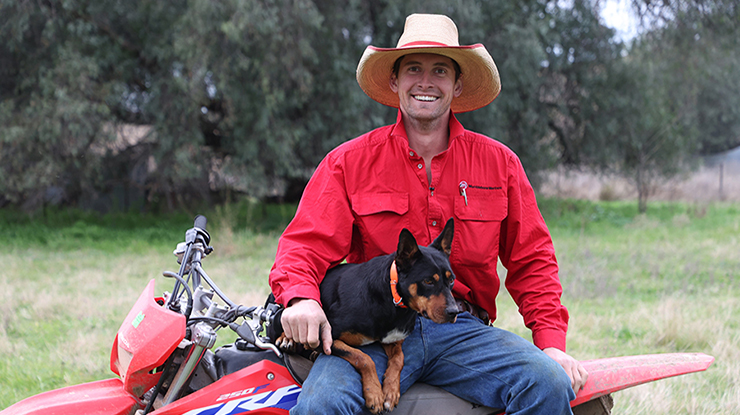 Jack Courts
Jack Courts
Sustainable goals are in Jack’s sight
Key points
- MLA-supported Nuffield Scholarship recipient, Jack Courts, is working towards sustainable goals.
- Adjusting systems on farm can improve efficiency, Jack looks specifically at changing the lambing system.
- Genetics are not only a key driver of efficiency but will help to achieve the 2030 climate targets.
MLA-supported Nuffield Scholarship recipient, Jack Courts, has a sustainable goal in his sights.
As one of 25 recipients of the 2024 Nuffield Scholarship, he’s keen to make the most of the award’s global networking and research opportunities while he investigates how improved maternal efficiency in ruminant animals can reduce waste.
Jack owns Glenalbyn Santa Gertrudis Stud and is farm manager at Mumblebone Merino Stud, Wellington, NSW.
His research goals are closely aligned with the red meat and livestock industry’s 2030 climate targets (CN30) – and he hopes his research will provide practical on-farm insights to drive efficiency and business resilience.
“I’m hoping to contribute towards resilience by finding ways to breed highly productive animals which will have faster growing offspring and more of them,” Jack said.
“Maternal efficiency is the ratio between the kilograms of lambs or cattle weaned to the kilograms of ewe or cow.
“I want to be able to increase profit, not just production, because we have to remain profitable in this volatile market with high commodity prices and changeable climatic outlooks.”
Feed efficiency
In dry times when livestock prices are down but feed prices remain stable, Jack said it’s important to make the most of the feed available.
“To optimise feed efficiency and energy storage we select for fat estimated breeding values. Fat is six times more efficient at storing energy than muscle,” Jack said.
Jack pays careful attention to meeting increased feed requirements of lactating ewes or those in their third trimester. He feeds out barley and lupins as well as fava beans, which are high in energy and protein.
“It’s cost-effective as we’re in a mixed area of production and can buy local. In 2018, we invested in 250t of on-farm storage so we’re able to buy commodities when they’re cheap and store them for later.”
Genetics fuel gains
Jack sees genetics as a key driver of efficiency, as a more feed-efficient animal produces less methane and carbon dioxide on high energy diets.
“There’s a big variation in methane production in sheep,” he said. “Without us changing a thing in our management – just changing which rams we buy – we can make genetic gains within a year.”
Jack will also use his scholarship to investigate how adjusting systems on farm can improve efficiency, with a focus on changing the lambing system.
This will include:
- scanning ewes not only for wet/dry but also for twin and single-bearing sheep
- splitting ewes up into different mobs to match their nutrition requirements
- selecting smaller lambing paddocks with more shelter and sufficient water points so twin-bearing ewes don’t need to travel as far.
Big-picture goals
The annual Nuffield Scholarship aims to accelerate research into innovative global concepts, techniques or systems relevant to the Australian red meat industry.
Throughout 2024, Nuffield scholars will travel internationally to investigate topics spanning from drought resilience and climate change to technology, genetics and agricultural policy.
Jack is grateful for the $35,000 bursary to fund his travel and research work. His Nuffield experience kicks off with a conference in Brazil where he’ll team up with fellow scholars to visit and learn from a diverse range of successful agricultural businesses and research institutions across the globe.



